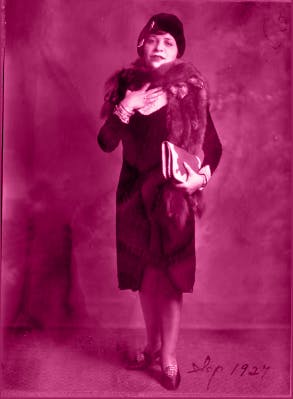About Us
Welcome to Polly’s, where we pay homage to a spirited, aspirational woman who commercialized sin and reinvented a means for young women to support themselves in a time when women often shied away from opportunity.
Polly Adler

Born with an adventurous spirit, Polly Adler loathed oblivion and was hellbent on being remembered. Determined to forge an original path, Polly left her family in Yanow, Russia and sailed to the “Golden Land” at the age of 14. After arriving in New York City and briefly working in a shirtwaist factory, Polly realized that the harsh conditions and low wages didn’t live up to the American Dream she had envisioned.
In 1920, Polly’s life took a fateful turn when she befriended Tony, a bootlegger and notorious gangster. Tony needed a private space for an illicit meeting and offered to cover Polly’s rent if she lent him her apartment. That simple arrangement became the first step toward her future as the Madam of New York. Polly quickly saw opportunity in the reckless spending of the city’s elite. She began expanding her network by frequenting nightclubs, discreetly spreading the word about her “house.” Not long after, she was arrested for running a disorderly house. Faced with a choice— reclaim her reputation or embrace the life of fast money—Polly chose the latter. For her, it was never about morality but economics.
In the end, Polly decided to turn what started out as an informal, casual transaction into a full time booming business. Her clientele soon included influential politicians, businessmen, and entertainers like Robert Benchley, Dorothy Parker, and several other members from the Algonquin Round Table, proving that literary wit wasn’t the only allure of these cultural icon.
Despite her multiple arrests throughout the 1920s and 30s, Polly’s business thrived, weathering both the Stock Market Crash and the Great Depression.
Polly was a trailblazer in her own brand of feminism. She valued the women she employed and rejected the idea that their profession defined them. In her memoir A House Is Not A Home, she dedicates an entire chapter to the personal lives of her girls—their breakfasts, conversations, and hidden talents. Polly cared about their well-being, asking only for a phone call if they disappeared for a few days. She wasn’t just running a business; she fostered a community.
"Her career has made her name synonymous with sin.”
-The Daily News
She joked that the only degree she held was from Jail University and is famously quoted for saying, “I am one of those people who just can’t help but get a kick out of life–even if it’s a kick in the teeth.” Her brothels became regular haunts for infamous gangsters like Arnold “the brain” Rothstein, a central figure in the criminal underworld of New York City, Lucky Luciano, one of the most influential figures in the history of the American Mafia, and Bugsy Siegel, a member of the Jewish mob who significantly contributed to the development of Las Vegas. It’s rumored she was even visited by a Vanderbilt, a Rockefeller, and then governor Franklin Delano Roosevelt.
People go to parties chasing more than fun—they’re looking for connection, community, and a sense of belonging. But for Madam Polly, society came to her. As the proprietress of New York’s most lavish bordellos, Polly mastered the art of good times, turning every night into an escape where worries were checked at the door and women earned on their own terms. In the city that never sleeps, where 5 PM marks the start of endless possibilities, why not spend your night at Polly’s?
